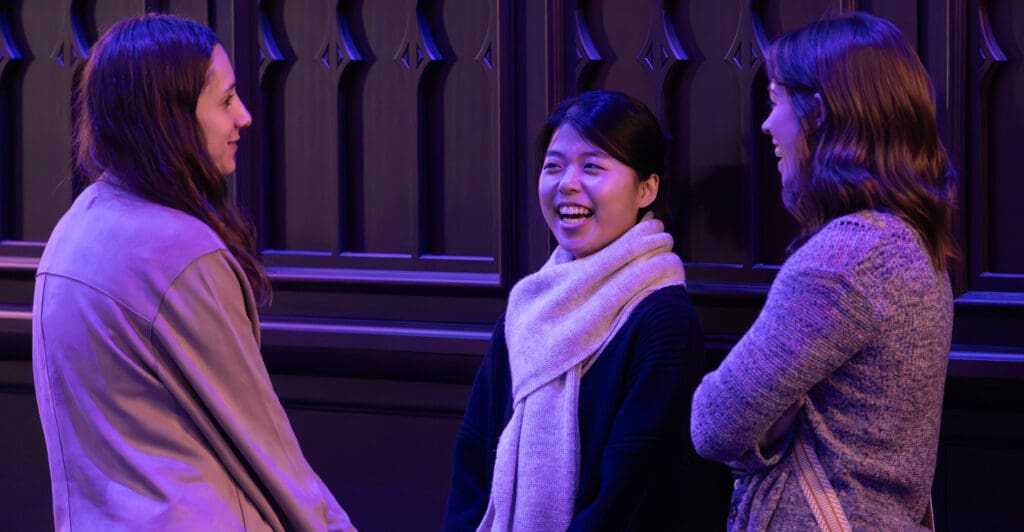
What a 2,000-Year-Old Story Can Teach Us About Friendship
Making friends as an adult shouldn’t be this difficult. Remember when friendship was as simple as sharing crayons in kindergarten or sitting next to a new person at lunch? Now, it feels like we need a PhD in social dynamics just to form meaningful relationships.
Finding and maintaining friendships can feel like an impossible task between demanding jobs, family responsibilities, and the general chaos of adult life. The usual advice—”join a club” or “try a meetup group”—sounds great in theory but often falls short in practice. Why? Because we overlook something fundamental about how genuine friendships develop.
This is where an unexpected source of wisdom comes in – the Easter story. Stay with me here, because this isn’t your typical Sunday School lesson. It’s a great example in friendship formation that’s just as relevant today as it was 2,000 years ago.
Join us for Easter Services at First Baptist Arlington – Plan You Visit
The Original Friendship Group
Think about the disciples – a random group from different backgrounds who became something like history’s first friend group. There were tax collectors (who were considered traitors) hanging out with zealots (who were killing traitors). Then, throw into the mix a bunch of fishermen, talk about an unlikely crew.
What’s fascinating is how their friendships developed. They didn’t start with perfect compatibility or shared Netflix preferences. Instead, they built connections through shared experiences – both the extraordinary and the mundane. They had meals together, walked together, probably argued about directions together (some things never change), and faced both victories and failures as a group.
Sound familiar? It’s quite similar to how deep friendships develop today.
What Made It Work?
Shared Purpose: They weren’t just hanging out. They were united by something bigger than themselves. Having a common goal or belief creates natural opportunities for connection.
Regular Time Together: They didn’t just text occasionally; they shared life together. True friendship requires what researchers refer to as “repeated unplanned interactions.” In other words, they spent time together often enough that it didn’t always need to be scheduled.
Vulnerability: They weren’t afraid to express their doubts, fears, and failures. Peter’s famous denial? That’s the equivalent of a significant friendship fail. Yet, he was welcomed back into the group.
Support Through Struggles:
Even when times were tough (really tough), they managed to find their way back to each other. The Easter story teaches us that true friendship endures through crisis.
The Modern Friendship Crisis Today’s world presents unique challenges to friendship formation:
We work longer hours
- Our phones create artificial barriers
- We move more frequently for jobs
- We’re afraid of rejection or awkwardness
- We wait for “perfect” friendship opportunities
- But here’s the truth: meaningful friendships rarely happen by accident. They require intention, vulnerability, and sometimes a little awkwardness.
Modern Application:
- Stop waiting for the “perfect” friend group – perfect is the enemy of good
- Create spaces for regular interaction, even if they’re brief
- Be willing to show up imperfectly and let others do the same
- Share your real life, not just your highlight reel
- Remember that everyone else is probably feeling just as awkward as you are
Practical Steps for Today:
Identify Your “Third Places”: Where can you regularly show up and see the same people? This might be a coffee shop, gym, or yes, even a church community.
Practice Micro-Connections: Start small conversations with people you see regularly. Remember, every deep friendship started with a simple hello.
Extended Invitations: Be the one to suggest coffee or lunch. Yes, it’s scary. Do it anyway.
Join or Create a Group: Find people with shared interests or start your own gathering. Sometimes leadership is just being the first person willing to be vulnerable.
Follow Through: When someone reaches out, make it a priority to respond and show up. Consistency builds trust.
The Truth About Friendship
Just like the first Easter showed us, transformation often happens in community. The disciples weren’t perfect – they made mistakes, had doubts, and sometimes failed each other. But they kept showing up, and that made all the difference.
The beauty of the Easter story isn’t just its spiritual significance; it shows us how authentic community can transform lives. Those first followers went from a scattered group of individuals to a tight-knit community that changed history—not because they were perfect, but because they were present.
Your Next Step:
Ready to find your people? We’re creating spaces where real friendships can form. Join us this Easter season for an authentic community where you can belong before you believe. No perfect life is required—just a willingness to take the first step.
Recent Posts
28 After the Sabbath, at dawn on the first day of the week, Mary Magdaleneand the other Mary went to look at the tomb. 2 There was a violent earthquake,…
11 Meanwhile Jesus stood before the governor, and the governor asked him, “Are you the king of the Jews?” “You have said so,” Jesus replied. 12 When he was accused…
17 On the first day of the Festival of Unleavened Bread, the disciples came to Jesus and asked, “Where do you want us to make preparations for you to…
24 Jesus left the temple and was walking away when his disciples came up to him to call his attention to its buildings. 2 “Do you see all these things?”…
